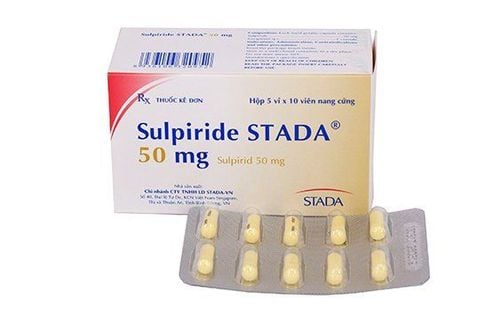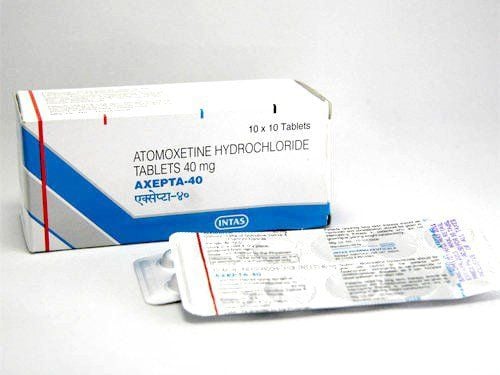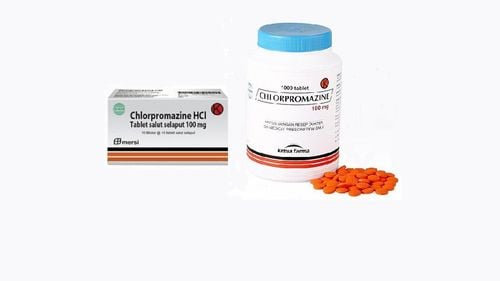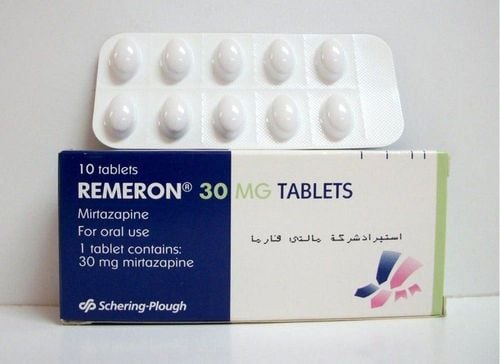This is an automatically translated article.
Levosulpiride 50 is a drug acting on the central and peripheral nervous system, helping to relieve symptoms of gastrointestinal dysfunction, sedative and antipsychotic. So how to use Levosulpiride and what should be noted?1. What is Levosulpiride 50mg?
Levosulpirid 50 has the main ingredient Levosulpirid 50, the dosage form is tablets. Levosulpiride belongs to the benzamide group, has antipsychotic effects through the mechanism of selective blockade of dopamine D2 receptors in the brain. Levosulpiride can be considered as an intermediate between neuroleptic drugs and antidepressants, because Levosulpiride has both effects. Levosulpiride also has the effect of increasing gastrointestinal motility by antagonizing Dopamine D2. Therefore, increasing spasm of the lower esophagus and helping the stomach and intestines contract faster and stronger. Studying the effect in stomach diseases such as bloating, slow digestion, the drug works to improve the above symptoms quickly.
2. Uses of Levosulpiride 50
Levosulpirid 50mg is indicated for use in the following cases:
Relieves symptoms in the gastrointestinal tract due to dysfunction including: Abdominal distention, epigastric discomfort, heartburn, belching, nausea , vomit. Has an antipsychotic effect and should be used in the treatment of acute and chronic schizophrenia.
3. Dosage and how to use Levosulpirid 50
How to use: Take medicine with water, should be taken before eating.
Dosage:
Adults and children over 14 years old:
Relieve symptoms of indigestion, functional bloating: take 1 tablet/time and 1 time a day. Treatment of acute and chronic schizophrenia: Take 4 to 8 tablets/day, divided into 3 times. Children under 14 years old: Not indicated.
Patients with renal impairment: The dose must be reduced or the interval between doses increased depending on creatinine clearance.
Creatinine clearance from 30 - 60 ml/min: Use a dose equal to 2/3 of the normal dose. Creatinine clearance 10 - 30 ml/min: Use half the normal dose. Clearance less than 10 ml/min: Use 1/3 of the normal dose. However, patients with moderate to severe renal impairment should not take Levosulpiride, if possible.
Overdose: Common with high doses from 1 to 16 grams, but no deaths even at doses of 16 grams. The clinical symptoms of each overdose patient are different depending on the dose administered. Doses of 1 - 3 grams can cause a state of dark consciousness, feelings of restlessness and rarely extrapyramidal symptoms. Doses of 3-7 grams can cause agitation, confusion and more severe extrapyramidal syndrome. With doses above 7 grams, in addition to the above symptoms may also experience coma and hypotension.
4. Side effects when taking Levosulpiride 50
Common: Insomnia or drowsiness, increased prolactin in the blood, increased lactation, menstrual disorders or causes amenorrhea.
Uncommon: Overstimulation, extrapyramidal syndrome with uneasiness, torticollis, eye rotation; Parkinson's syndrome; Prolonged QT interval causes arrhythmias, torsades de pointes.
Rare: gynecomastia in men, tardive dyskinesia; malignant high fever syndrome due to neuroleptics; orthostatic hypotension, bradycardia or arrhythmia.
Other side effects: Hypothermia, photosensitivity, jaundice due to cholestasis.
Inform your doctor if you experience unwanted effects when using the drug.
5. Pay attention when using Levosulpirid 50
The drug is contraindicated in patients with hypersensitivity to any of the ingredients.
Need to strengthen monitoring for the following subjects such as people with epilepsy, because there is a possibility that the seizure threshold is lowered; Elderly people have the disease because they are prone to orthostatic hypotension, somnolence and extrapyramidal effects occur. People with impaired kidney function...
Due to the drug may cause dizziness or neurological disorders when used. Therefore, caution should be exercised for those who must drive and operate machinery.
Pregnancy: Like other sedatives, Levosulpiride crosses the placenta and can cause unwanted effects on the nervous system of the fetus, so it should not be used during pregnancy, especially during the first 16 weeks. . Lactation because Levosulpiride passes into breast milk in relatively large amounts and may cause undesirable reactions in the nursing infant, so it should not be used during breast-feeding.
Drug Interactions: Levosulpiride may interact with some drugs that reduce the effect or increase the risk of side effects of the drug
Interaction with alcohol this can increase the sedative effect of the drug, so avoid drink alcohol and alcoholic beverages while taking Levosulpirid 50.
Above is some information about Levosulpirid 50, you need to use it under the direction and guidance of your doctor. Avoid self-use because of the risk of harm to the body.
Please dial HOTLINE for more information or register for an appointment HERE. Download MyVinmec app to make appointments faster and to manage your bookings easily.













